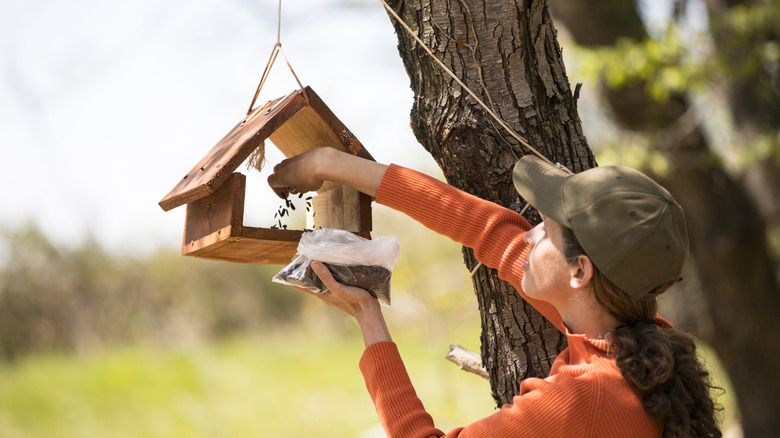There's A Good Reason To Keep Only One Sort Of Seed In Your Bird Feeder
We may receive a commission on purchases made from links.
Birds are naturally messy eaters. They fight over seeds in a feeder or may get frightened by something else in the garden, and their flapping wings can spill feed everywhere. Some birds vigorously pick through the mix, tossing the less desirable varieties to the ground. These viable seeds will readily germinate where they fall, growing quickly into a plant (or weed, as many see them). Further, seeds can also spread through bird excrement, meaning that you could have weeds and plants growing up all over your property. If you don't want your lawn or garden beds full of random vegetation, feed birds a single type of seed — one you don't mind them cultivating for you.
Bird experts regularly promote black-oil sunflower seeds as the top single-seed option. Other seeds commonly used in bird feed mixes include safflower, thistle, millet, corn, peanuts, sorghum, flaxseed, and rapeseed. While you may not mind stunning sunflowers that will brighten your property popping up all over the place, plants like thistle are considered invasive in the United States, so you don't want them growing in your yard. Not only that, but allowing many different seeds to sprout up around your property can give it an unkempt look.
Choose your seed
If you're convinced that a single-seed approach is best for you and your local birds, how do you choose which type to invest in? There are two ways to go about this: consider what the regular visitors to your garden like to eat or research the seeds and grains the bird species you want to attract to your yard prefer. For example, the American goldfinch eats hulled over unhulled sunflower seeds. Peanuts are a favorite of bluejays, chickadees, titmice, and woodpeckers.
Though a bit more expensive than bird feed mixes, single-seed packs are still relatively affordable. Menards has 8-pound bags of Safflower Seed Premium Bird Food by Enchanted Garden for about $12 each. Another option is on Amazon, where you'll pay around $18 for 5 pounds of Happy Wings Black Oil Sunflower Bird Food. You could also beat the birds at their own game and cultivate your own bird seed — from corn to millet, most bird seed plant species are easy to grow. Place your feeder above those beds, and you'll never need to worry about how deep you should be planting your seeds again. Another option is to feed birds only during the winter, as fallen seeds are far less likely to sprout when outside temperatures are low.
